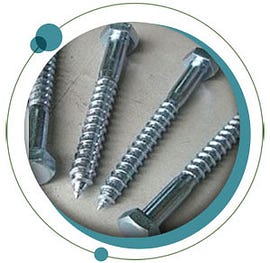More from hiltonsteel hiltonsteel
More in Politics
Related Blogs
Archivo
compartir social
Role of screws and bolts in industries
Cuerpo
The industry uses thin fasteners to assemble products ranging from pipelines to heavy earthmoving equipment, cranes to bridges, and much more. Its primary function is to create a clamping force throughout the joint so that the joint can withstand operating conditions without loosening.
Properly tightened bolts use their elastic properties, and to work well, they must behave like springs. The stress in a bolt is directly proportional to its deformation. The stress-strain relationship of a bolt has an elastic zone and a plastic zone. Hex Bolt manufacturer in India deals with the best quality products in a wide range.

All applied elongation within the elastic zone is released when the load is removed. The magnitude of the extension increases when more loads are applied. When a bolt is subjected to stresses over its proof load, the elastic elongation changes to plastic deformation and the deformation is no longer proportional to the stress. You can buy the best bolt from Stud Bolt manufacturers in India.
In plastic deformation, a part of the elongation will remain after the load is removed. The point where this permanent elongation occurs is called the elastic limit. Welding metal studs into sheet metal can be done in a simple, efficient and automated way. Using bolts and clips instead of holes and screws offers several advantages:
- Saves time: Stud welding takes seconds instead of minutes with traditional arc welding processes thanks to auto-feed capability for high-volume applications.
- “No-Hole” Fastening: Eliminates the need for drilling and tapping with a full joint penetration (JCP) weld, which uses the full cross-section of the stud. In addition, there are no leaks at the connection point.
- Reliability and repeatability: The same weld is always obtained due to the ability to monitor processes.
- Weld Strength: The weld is stronger than the stud or parent metal alone, allowing engineers to design with the potential failure of the studs or parent material in mind.
- No certified welder is needed: the process is easy to teach and can be done for less labour.
- Return on Investment: The process provides significant labour savings and is fast and efficient, leading to a quick payback on capital investment.
The screws have two parts: the shank or body and the head. They are usually measured in millimetres if the metric system is used or in inches or fractions if the English system is used. There are several types of thread, the most used being the metric and the with worth thread, although there are many more. The usual direction is to the right, except in specific unique pieces, locknuts, etc. The relationship between length and diameter is proportional. The heads also vary in shape, prepared for different tools: Allen keys, star screwdrivers, etc.
Self Tapping Screw manufacturer in India offers a wide variety of screws, depending on their shapes, sizes, and qualities. Screws due to the characteristic of their materials have particular uses, such as those of titanium used for the aeronautical industry or medicine (because it is a non-toxic material for the body). You could continue like this for a long time.










Comentarios